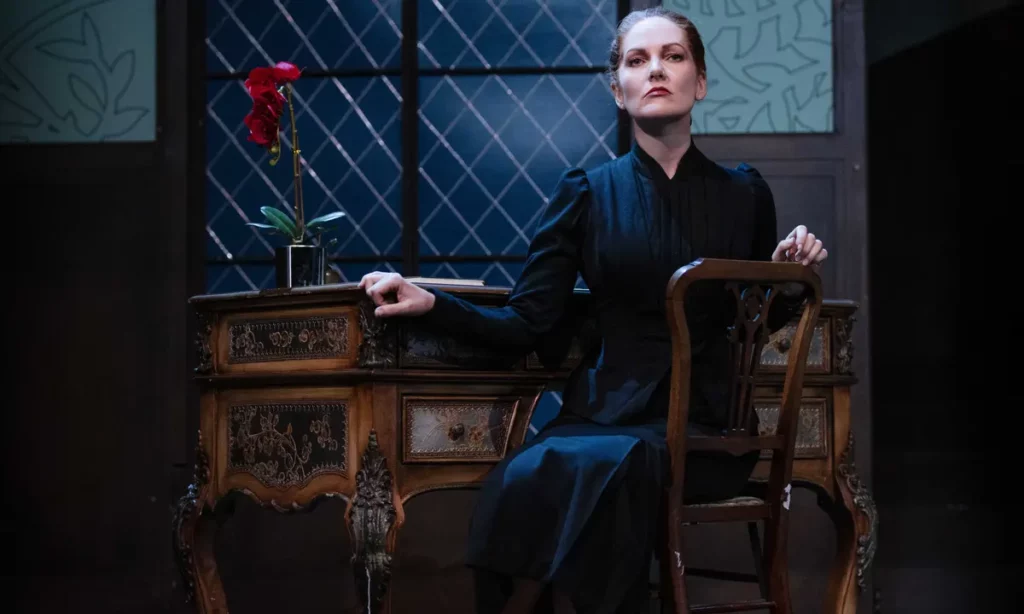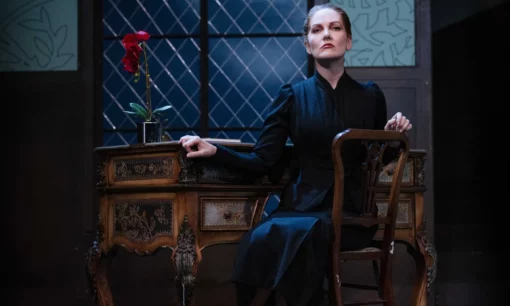Rebecca at the Charing Cross Theatre: a subdued rise from the ashes, four stars
Ruth Almodal, October 23, 2023

The Past: Last Night I Dreamt of Manderley
On the surface, Daphne du Maurier’s 1938 novel seems ideal material for a musical. Telling the tale of an awkward, lower-class nameless protagonist whisked away to her wealthier husband’s Cornish estate but finding herself at odds with the legacy of his titular ex-wife and her oppressive housekeeper, Rebecca is one of the most enduring Gothic novels. With its memorable characters, commentary on class and variety of locations, it seems as though it was tailor-made for the stage. In fact, du Maurier staged her novel only one year after its release. It has also spawned two films: Alfred Hitchcock’s Academy Award-winning adaptation in 1940, and Ben Wheatley’s less-lauded adaptation in 2020.
So when German lyricist and librettist Michael Kunze of Tanz der Vampire and Mozart! fame decided to take Rebecca under his wing, it seemed like a natural fit. His version of Rebecca premiered in Vienna to critical acclaim, enjoying a run of over three-years. Rebecca conquered Japan, Korea and much of Europe. Things were looking good for a Broadway and maybe even West End run.
However, English-language productions of Rebecca seemed cursed. The Broadway production was plagued with cashflow issues that eventually revealed themselves to be the result of fabricated investors. Across the pond, renovation of the Shaftesbury Theatre, Rebecca’s West End home, had to be halted to due the discovery of an ancient stream below. Both productions quietly dropped off the face of the planet, never to be heard from again.
Until now. For a limited run, until the 18th November 2023, Rebecca has risen from the ashes of its past for its English-language premiere. But will it live up to the hype?
The Present: Help Me Face The Night
Tucked away under the arches of Charing Cross Station is a charmingly intimate venue, a unique experience for those accustomed to the grandeur of the West End. The black vinyl floors, and patterned red carpets harken back to another era, back to rehearsal rooms, to hometown community centre theatres. Although the auditorium is small compared to the lavish venues that Rebecca has previously been staged in, you certainly don’t feel it. It seems as though anything is possible at the Charing Cross Theatre.
Indeed, Rebecca is an interesting choice of production for a venue seating only 265 people. I found myself wondering how the lavish sets Rebecca is known for would translate to a smaller stage. Would the famed staircase on fire make an appearance?
While the answer is unfortunately no, this staging of Rebecca maximises the space it has to its full potential. We open with black and white projections, instantly recalling the Hitchcock adaptation of du Maurier’s book. The modest sets open and close in on themselves like the pages of a storybook. Actors move around the aisles, ‘selling’ ice cream or proclaiming “There’s no celebrities here!” when peering through the crowd. These were welcome novelties that bridged the gap between Rebecca and its history, a modern audience and the world of the 1920s. Everyone knows Rebecca’s beats: but do they dare to peer below the surface?
The casting was also a highlight. With a beautiful birdlike voice, Lauren Jones plays ‘I’/the second Mrs de Winter as an innocent childlike doll, with a relatable awkward edge that adds another layer of sympathy to her character. Maxim de Winter, man of the manor, is played with masculine brooding by Richard Carson. Together, the two form a pair convincingly mismatched in such a way that makes you root for them. Their duet, “Help Me Face The Night”, is a sweet, soaring song in which the two share their desire to break free from the past.
Kara Lane gives an oppressive, ‘evil-stepmother’esque performance as the deliciously gothic Mrs Danvers. Her loyalty to the deceased Rebecca de Winters is felt not only in her wickedly cruel putdowns of ‘I’, but also in her almost sapphic dedication to keeping her memory alive. Whether intentional or not, Mrs Danvers forcing ‘I’ to don Rebecca’s negligee while brushing the empty length of her hair where it literally ‘falls short’ seems to suggest a jilted lover. Kara’s performance truly convinces you that although Rebecca herself is famously never seen, her memory lives on, in the untouched rooms of Manderley, in the gossip of the servants, in the crashing of the waves that literally whisper “Rebecca…Rebecca…”. Indeed, in the deliciously epic power ballad that is the title song, the last “Rebecca” is opted up, sending her name across the house in a wave of sound.
Completing the cast is a delightful ensemble taking on the roles of servants, journalists, townspeople. In the vein of such musicals as Phantom of the Opera and Les Misérables, they are a crucial part of setting the scene. The dissonance between the isolated, uppity world of Manderley and the unforgiving, brutal Cornish coast can be found through quirky gossipy songs (‘What A Night’) or tempestuous sea shanties (‘Flotsam and Jetsam’).
Speaking of the music, Rebecca is almost entirely sung-through. There are a few powerful ‘earworm’ songs that I expect are popular in the audition room, yet for the most part a lot of them are transitional. As a work in translation, some of the wording seems a little stilted, but is mostly negligible. Additionally, there seems to be a lot of tonal dissonance: the ‘Favell’ character has a song in the second act called ‘I’ll Scratch Your Back’ that seems to be giving more Disney sidekick than villain.
The music seems to include a lot of synthesisers, giving a very late 20th century feel to an early 21st century production. I personally didn’t think this worked well, especially as Rebecca boasts an 18-strong orchestra but if it wasn’t for an announcement about the conductor, I would have assumed the music was entirely prerecorded. The first song ‘Prologue/Last Night I Dreamt of Manderley’, is a soaring ballad that is undercut by a mismatched rock percussion, and the seemingly uneven levelling meant I was having a lot of trouble hearing the lead actress. But this seemed to resolve as we progressed, and didn’t detract from my experience too much.
Overall, this version of Rebecca is a wonderful production that breaks free of its constraints and legacy while also acknowledging them. It’s darkly ironic that a story that follows its characters choosing their own destiny and escaping its past would find itself doing the same. Rebecca ends rather abruptly after the burning of Manderley, where Maxim and’ I’ find themselves having risen from its ashes. The ghost of Rebecca looms heavy, and the couple turns to the audience as if to say, we know. But then the curtain drops, and Rebecca is over.
The Future: (We Lived) Through The Night
Now having seen the musical I’m excited to see how other adaptations such as the Hitchcock and more recent film handle the source material, as well as going back to the book itself. The fast-paced, simplistic story appeals to me as a fan of gothic thrillers with queer themes- just take your pick of any of the recent Mike Flanagan adaptations and I will probably have liked it.
With the source material approaching a century in existence, I feel as though obvious modern themes could be examined more for the 21st century audience. As well as the aforementioned queer undertones, Maxim’s two-sidedness read almost abusive at times. This is something that should be called into question and criticised, especially in the wake of the #metoo movement. I would love to see another adaptation of Rebecca highlight its feminist themes in more detail, but understand that this requires a more radical storytelling approach that may not be quite there yet.
I do hope that this English language adaptation picks up steam. Possibly, I foresee it transferring to the West End in favour of the lavish welcome it never received and perhaps a production more faithful to Michael Kunze’s original vision. As a musical well-received by the non-Anglo sphere, in particular Germans and Koreans, it would be an exciting draw for tourists familiar with it. Rebecca is an important piece of British Gothic literature, and would also be a draw for more local tourists.
However, the scaled-back nature of this production also opens the door for immediate touring. I can see this picking up steam on the UK circuit, particularly in more coastal and rural areas where there’s less access or appeal in popping down to London for a show. Although the audience was diverse enough to where I, a Southeast Asian in my twenties, didn’t feel out of place, it did skew older. These people likely grew up reading Rebecca and/or watching the Hitchcock movie, and judging from the excited hubbub during the interval and after the show they were very satisfied with the production. But Rebecca also beckons a younger crowd: I certainly wouldn’t have heard of the production if not for Waiting in the Wings’ fabulous produced documentary series about it available for free on YouTube, probably would have given it a miss if not for the promotion by TodayTix. Rebecca is a timeless story, and keeping the conversation going to ensure it stays that way is important.




